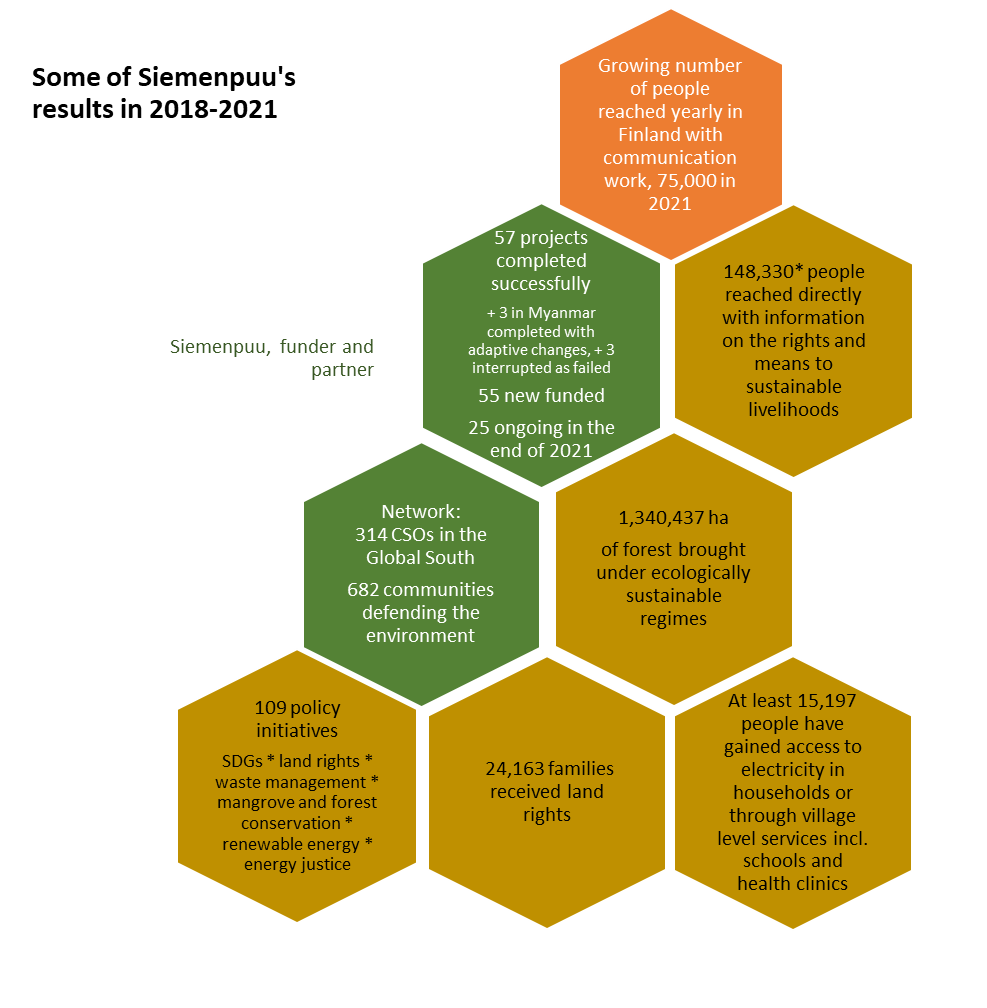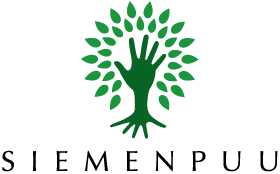In the programme period 2018-2021, total of 63 Siemenpuu-funded projects were completed. In these projects:
- over 320 civil society organizations were cooperated with;
- More than 680 indigenous or local communities were supported with project activities;
- More than 24,000 families (over 120,000 low-income people) had their land rights confirmed or livelihoods improved;
- Almost 150,000 people received information about their livelihood rights directly, and over 10 million people via mass media;
- More than 300 households, as well as schools and health clinics benefiting over 15,000 people, were electrified with renewable energy;
- Over 1.3 million hectares of new forest areas were brought under ecologically sustainable regimes;
- Civil society organisations formulated 109 policy initiatives to advance the rights of indigenous people and local communities.
In the programme level, most of the targeted result levels in the chosen indicators were achieved, and some were exceeded. In communications work, Siemenpuu cooperated increasingly with different actors in publications, events and global education projects, thus reaching more diverse and wider audiences than before.
The main results of each completed Siemenpuu-supported projects are published annually at the Finnish-language pages. Since 2018, Siemenpuu has published the Results Reports in English, which can be downloaded in pdf form from the buttons below.
Below is a table of the main short-term outcomes and their result levels of the programme 2018-2021, and below the table, a diagramme summarizes the achievements of Siemenpuu and its Southern partners with key indicators.
| Short-term outcome | Results 2018-2021 |
| Members of low-income rural communities have received information about their rights to bio-cultural heritage, natural resources, food security and sustainable energy | At least 148 330 people directly + additional 10 020 000 people via websites and mass media |
| Members of low-income rural communities have defended or obtained ownership or users’ rights to land and made ecologically sustainable use of them | At least 24 163 families (120 815 people calculated with an average family size of 5 members) |
| Indigenous communities have documented and obtained rights to their bio-cultural heritage | At least 53 849 members of communities |
| Low-income female and male farmers have got improved access to indigenous seed systems, organic fertilizers and other means of agroecological production | 3 189 farmers |
| Low-income households have obtained access to ecologically sustainable energy | At least 15 197 people |
| Land areas that are currently designated for conservation or are under ecologically sustainable use are maintained and not converted to monocultures or infrastructure | 3 520 184 ha |
| New forest areas and other important ecosystems are formally included in regimes that maintain or improve their biological diversity and positive carbon balance | 1 340 437 ha |
| Community based groups and local civil society organisations develop their knowledge and skills relating the rights-based approach to ecologically sustainable well-being and organisational management | 326 CSOs and at least 682 communities |
| Popular movements and civil society organisations formulate popular demands and policy initiatives to advance the rights to sustainable living | 109 initiatives (not including general negotiations and permit processes) |
| Siemenpuu’s work, its results and the issues advocated by its Southern partners have gained publicity and more support for Siemenpuu’s work in Finland | Ca. 240 000 people reached (yearly results summed up) |
| Finnish people’s awareness on environmental problems in the South and negative effects of overconsumption have been increased and they are motivated to act for a sustainable future | Ca. 7 500 people reached with personal impact (yearly results summed up) |
| Finnish decision and policy makers directly or indirectly influencing the Southern communities and partners have been influenced by Siemenpuu | 9 major position papers actively circulated, several impactful seminars and meetings with Finnish decision makers |

